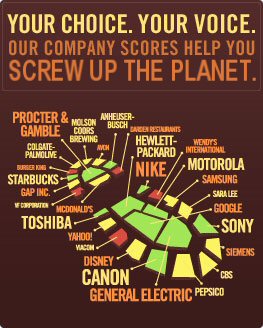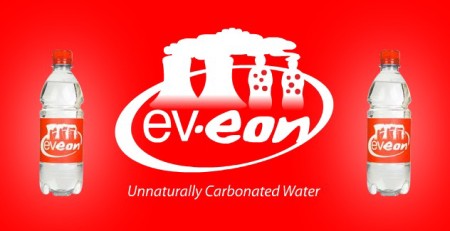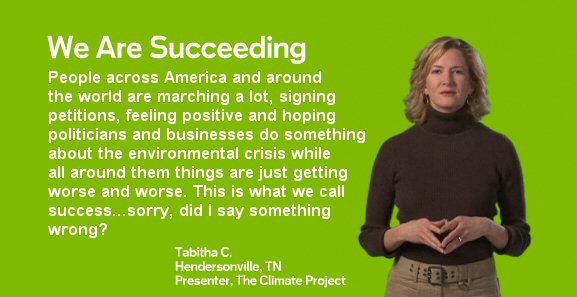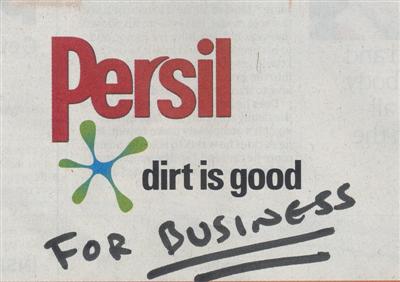No Clash Of Cultures In The Greenwashing Gala
Posted by keith on 20th January 2009
I wonder how they are all feeling this morning – the morning after the International Conservation Caucus Foundation 2009 Inauguration Gala. It was a chance for people to talk about the way forwards in preserving the planet for the future, in the light of promised change in the political landscape (isn’t Hope wonderful?); it was a chance for corporate-friendly conservationists and politicians to network with each other; it was an opportunity for some of the most destructive corporations on Earth to talk up their ‘green’ credentials; it was — in short — a Greenwashing Gala.
Climate Progress takes up the story:
Q. If an inaugural gala is sponsored by ExxonMobil, can it still be green?
A. No.
The NYT reported yesterday on tonight’s two big “Green Galas”:
The first gala is being held by Al Gore, the former vice president and Nobel laureate. His event is also joined by a no-compromise crowd long frustrated with the Bush administration. Among them, the Sierra Club, the Natural Resources Defense Council….
The second gala is being held by the International Conservation Caucus Foundation, comprising the goliaths of international and animal wildlife conservation like the Nature Conservancy and the World Wildlife Federation.
Inexcusably, “Exxon Mobil is a prominent sponsor of the event.” The oil giant has spent millions of dollars over the years as a principal sponsor of the global warming disinformation campaign aimed at stopping efforts to conserve a livable climate — even after they said they stopped such funding. Chris Mooney has an excellent piece on ExxonMobil’s two-decade anti-scientific campaign
…
The non-green gala has other non-green elements:
Roses will be flown in from Ecuador. Marinated beef is being flown in from Texas to Virginia, where it will be grilled and then trucked to the auditorium.
Wow, that’s a two-fer — beef and air shipment!
While in general I don’t think individuals or groups should obsess about these kind of individual actions, it’s absurd for an environmental or conservation organization to flaunt unsustainability:
“We are not into symbolism,” David H. Barron, the caucus president, said unapologetically. “We are focused on a much bigger impact.”
Mr. Barron says that personal efforts to lower energy use are admirable; he himself uses low-energy LED’s at home. But more gets done to protect the environment, he says, when big corporations get involved in a committed way.
This may explain why Exxon Mobil is a prominent sponsor of the event.
Climate Progress has focused on ExxonMobil, but as you will see in my comment below the piece, virtually everyone attending — whether corporation or ‘environmental’ group — is swilling in the same trough…
What a load of stupid f*ckers. I’m not going to tone down my language [ok, I did for The Unsuitablog]: when you see not only ExxonMobil, but JPMorganChase (they invest in anything bad), AFPA (clearcutting apologists), Chevron (just as bad as ExxonMobil), Unilever (massive user of palm oil), Nestle (baby milk murderers) and a host of others doing this it just makes my teeth grate.
It’s a greenwashing beanfeast, and I have no doubt they know this. Let’s just say it’s a great opportunity to lobby and network for the next stage of the denial plan – after all, we know what has gone wrong, now we all need to be shown how corporations are going to save the world.
As for WWF; they are corporate-loving symbolists (http://www.thesietch.org/mysietch/keith/2008/01/15/wwf-buy-yourself-a-new-corporate-image-part-1/) who will feel very much at home there. The Nature Conservancy don’t even deserve a comment, this will do instead: http://thesietch.org/ mysietch/ keith/ 2008/ 04/ 19/ the-nature-conservancy-partnering-with-poisoners/
Keith
It’s worth reading the rest of the comments, too: if you think greenwashing, corporate-conservation love-ins and politicians pretending to care while keeping their pockets open (for that is what ICCF is all about) is what these things are all about, and refuse to accept them, then you are not alone.
Posted in Corporate Hypocrisy, NGO Hypocrisy, Political Hypocrisy, Should Know Better, Sponsorship | No Comments »














